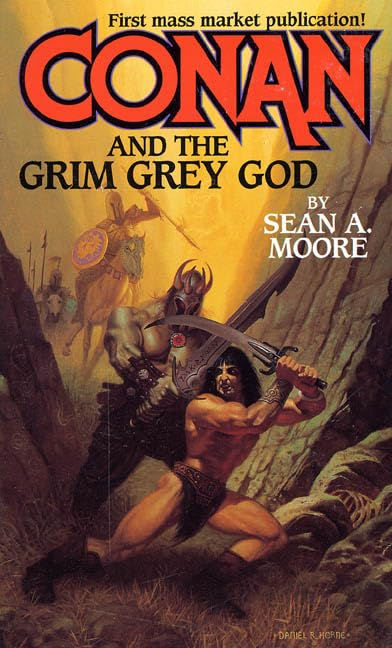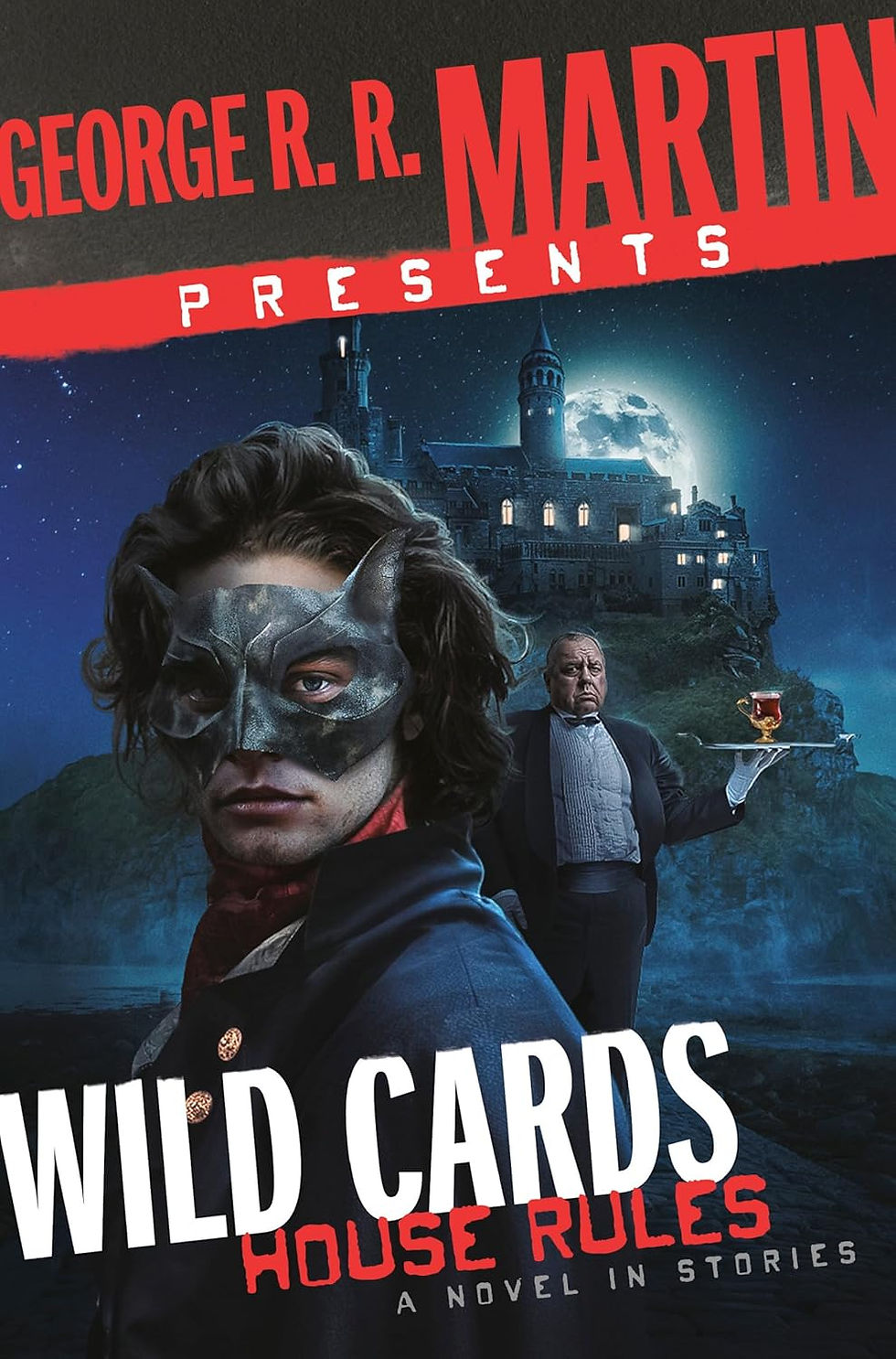Conan of the Red Brotherhood
- cyborgcaveman
- Apr 22, 2025
- 6 min read
Updated: Apr 25, 2025

Written by Leonard Carpenter, Conan of the Red Brotherhood is a passable entry in the Conan franchise, replete with all the elements needed for a rousing adventure. Unfortunately, the many disparate elements don't quite coalesce until the last second, and even then never fully mesh into a seamless whole. One gets the impression Carpenter was juggling too many pieces at one time to fully develop any of them.
The title lets Conan fans know this is a pirate adventure, but this one takes place on the inland Vilayet Sea rather than the open ocean, which I had thought was the home of the Red Brotherhood mentioned in the story Red Nails written by Robert E Howard. As I read further, the names Olivia and Ivanos sparked a memory of Iron Shadows in the Moon, also by Howard. At first, it was hard to reconcile this Olivia with the one from Iron Shadows in the Moon, but who else could it be, especially as one of the pirates loyal to Conan is named Ivanos. This pedigree hearkening back to Iron Shadows makes Olivia an intriguing, if not especially pleasant character. As just one of three primary female characters in this adventure, the other two being Philope and Sathindrissa, Carpenter might have decided she needed something to distinguish her from the usual run of damsels that find their way into Conan's arms.
Olivia's time with Conan aboard a pirate vessel has toughened the once passive beauty and made her quite jaded. She isn't the timid, escaped slave girl, fleeing a sadistic master, who Conan once met in the marshes along the shore of the Vilayet Sea. She is now demanding, impatient, and a little shrewish. But this strikes me as a realistic character arc for a woman Conan promised to make a queen but spends most of her time on a boat or in a squalid port run by brigands. Conan picking up an extra piece of pretty baggage in the form of Philiope doesn't help matters either. Nor does Philiope turn out in a predictable manner, though her story isn't fully satisfying either.
At first glance, it seems Philope is the gently born half of a classic switcheroo; a handmaid and her mistress switching places when their vessel is attacked by pirates. Except the twist never comes. There is no pay off. The twist isn't there, but it isn't subverted either, because things appear to be set up for a final revelation that never comes. The noblewoman kills herself, which is what you might expect a sheltered and terrified lady to do if she was disguised as the maid and trapped among pirates, but the well-dressed lady is the one that offs herself. Therefor, it seems Philope is exactly what she appears to be, a handmaiden besotted with Conan, and nothing more. Maybe Carpenter had to weed out some unnecessary subplots or decided the noblewoman was one too many female cast members to keep up with.
It should be noted some online sources claim Philiope is in fact the daughter of a nobleman. I might have misread the situation or glazed over some vital line in the story which clarified matters. I think it speaks to the jumbled quality of the storyline that there is any confusion surrounding the matter at all. Perhaps it was meant to serve as a contrast; Olivia, the slave girl eager for the life of a gently bred lady, and Philope, the nobly born woman happily taking to the life of a pirate wench. In any case, when it comes to female pirates, Philiope and Olivia both are novices compared to the last of the three leading ladies.
Sathindrissa is captain of Tormentress, a slave galley crewed by female freebooters and male rowers chained to their oars. Described as lean, tanned, and leather clad, she is something of a Red Sonja type (yes, purists, I know the comic book Red Sonja bears little resemblance to the two different Howard heroines that inspired her). Conan has to defeat the battle savvy pirate queen in single combat before he can screw her on the deck of her ship with all aboard, including the enslaved male rowers, craning for a better look at the action. Conan is disquieted by Sathindrissa's use of slaves on her vessel, especially because pirate crews often have escaped slaves among their number, but he doesn't go out of his way to liberate them either. The fact that he had been betrayed and overthrown by rival pirates at the time might have been a factor in his decision to let things be.
If all this wasn't enough, Emperor Yildiz's power hungry son Yezdigerd has proposed a contest to improve and update Turan's navy in order to combat the threat of the Red Brotherhood. It amuses Yildiz to consent to the plan and a variety of alchemists, philosophers, engineers, and a sorcerer all answer the call to devise deadly improvements for the Turanian vessels. The initial councils where this is decided are seen through the eyes of a corrupt court official eager to skim money from the funds and materials provided to the entrants, but the primary POV character for most of it becomes Alaph, a former baker's boy that has accidentally stumbled upon steam power.
In the context of the Hyborian Era, Alaph thinks of steam power as water spirits and fiery djinn interacting to become a dangerous but intriguing power source. Alaph bumbles along, gradually perfecting his coffin-shaped boiler and a steam-driven ram as his fellow competitors are whittled away either by ineffectiveness or treachery. The baker's boy turned alchemist could have made an interesting protagonist in a sword and steampunk story centered around the contest, but this is a Conan novel, which by its very nature makes him a secondary or even tertiary character, dooming Alaph and his discoveries to irrelevance. We know there are no steam powered vessels in the stories that happen later in Conan's career, so things don't look too good for little Alaph from the get-go.
Crotalus, the obligatory sorcerer, is a humorless mage from Zembabwei. Not content with merely mastering his people's hypnotism and folk magic, Crotalus had ventured into the wider world to expand his knowledge of the black arts, eventually landing in Turan. His plan for the naval competition depended upon retrieving a cluster of pearlescent orbs from a nameless isle in the Vilayet. Like other wizards before him, Crotalus runs afoul of Conan, who steals not only one of the ships Yildiz has appointed to the mage but also the pearly globes he was after. The gems were guarded by deadly man-sized centipede-like creatures, making it fairly obvious to the reader that the glittering orbs are actually eggs. With as many monsters Conan has dealt with, one would think the barbarian would realize this too, but that would just complicate (or perhaps simplify) an already overloaded storyline.
Seeking to "rescue" Olivia from captivity in the capital city, Conan is instead captured thanks to his ex-lover's wiles. Tossed into the dungeons with the other pirates, including Ivanos, and scheduled for public torture and execution, Conan and the other prisoners try various plans to secure their freedom. After seizing control of part of the dungeon, Conan and company manage an escape with some help from an unnamed eunuch and a half-glimpsed woman. Whether this is supposed to be a remorseful Olivia or one of the emperor's harem girls sent to help undermine the avaricious prince is uncertain.
Everything culminates in a battle between the hodgepodge pirate fleet, including the imperial flagship Conan and company steal during their jailbreak, and the three remaining ships of the naval tournament, Alaph's steampunk, djinn-powered anachronism, the vessel rowed and defended by Crotalus's one giant, magic-magnified centipede, and a bireme crewed by brainwashed, half-undead slaves with metal oars honed to razor sharpness. What should be a cool battle becomes a rushed affair. I was literally counting the remaining pages as I read, wondering how it could all be brought to a satisfying conclusion. Ultimately, Conan gets a few licks in, but Alaph becomes the unintentional hero that blows Crotalus's monster into pieces, the baker turned alchemist dying with his steam-powered creation.
A solid and even memorable entry among the hordes of Conan franchise paperbacks that still doesn't make it to the short list of the best non-Howard offerings. It does get points for anchoring itself in and springing off from an established, canon story, and I enjoyed what Carpenter did with Olivia's heel turn. The concept of the naval tournament was also strong, but it ate up too much of the page count without adding enough to the overall stakes, and could have worked well enough on its own for an entire steampunk novel. Knowing Alaph and his ship were doomed from the start essentially gave away how the giant monster was going to be killed before the final battle even began.



Comments